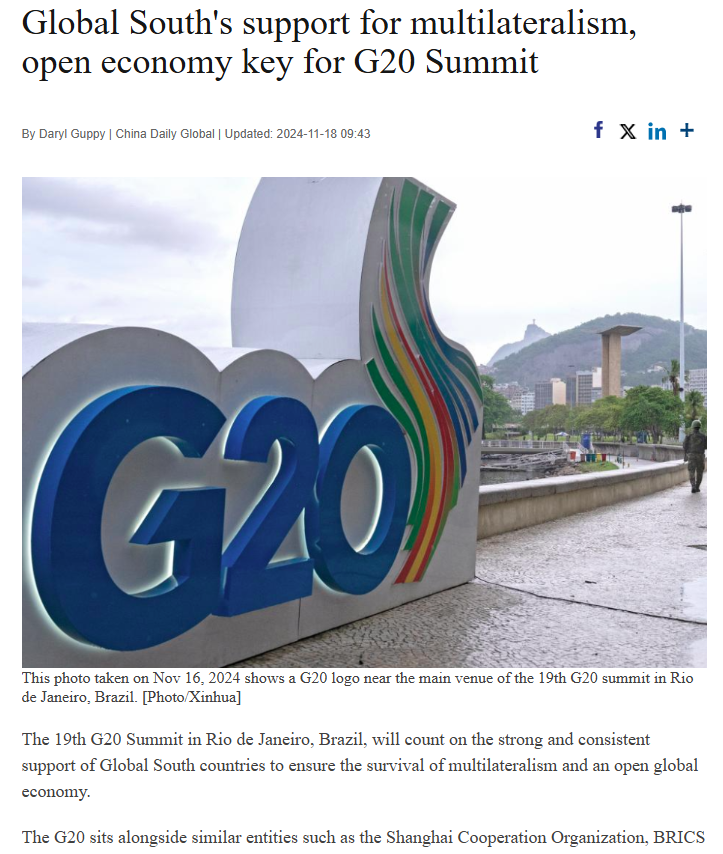LATEST INSIGHTS
Your Present Location: LATEST INSIGHTSDaryl Guppy: Global South's support for multilateralism, open economy key for G20 Summit
Source: China Daily Published: 2024-11-18

By Daryl Guppy
The 19th G20 Summit in Rio de Janeiro, Brazil, will count on the strong and consistent support of Global South countries to ensure the survival of multilateralism and an open global economy.
The G20 sits alongside similar entities such as the Shanghai Cooperation Organization, BRICS and the Asia-Pacific Economic Cooperation. These groupings understand the way open trade contributes to global economic growth, which is the foundation for building prosperity, including in the Global South.
As the largest developing country and a natural member of the Global South, China recognizes that sustainability rests on global cooperation that is not hindered by tariffs, unfair taxes, sanctions or political barriers that hamper trade, trade settlement and the exchange of ideas.
Unfortunately, the G20 consensus on these objectives may face opposition from the incoming administration in the United States.
The G20 meeting takes on particular significance because it must prepare for a more combative trade and economic future shaped by US delegates who cast a shadow over the G20 ambitions to build a just world and a sustainable planet, because it is unlikely the current US policy position will remain the same under the new administration.
The well-known pillars of US President-elect Donald Trump's trade agenda are based on 20 percent to 60 percent tariffs, sanctions, protectionist barriers and the destruction of international organizations like the World Trade Organization.
As a premier forum for international economic cooperation, the G20 plays a critical role in steering the global economy through the significant challenges it faces. The task facing the G20 is to develop strategies to provide a bulwark against the US attack on free trade, which sits at the core of the economic challenges posed by inflation and stalled economic development.
China is one of the strongest of the G20 economies in its full support for free trade within the framework of WTO rules and procedures. China's trade disputes with the European Union are resolved through the WTO using the structure that is a temporary substitute for the WTO appeals court. In its attempt to destroy the WTO, the US has blocked the appointment of appellate judges for seven years.
China is steadfast in its full support for the globalization of trade. The seventh China International Import Expo in Shanghai is evidence of global support for China's role in the global economy.
President Xi Jinping's scheduled participation in the G20 Summit in Brazil highlights China's firm support for multilateralism and underscores its high regard for G20 cooperation.
China has become a major advocate for an equal and orderly multipolar world. Its strong stance against protectionist policies is matched with its consistent support for inclusive and universally beneficial economic globalization.
The 19th G20 Summit in Rio de Janeiro takes place at a critical juncture because never have the forces against an open world economy been so strong.
China's commitment to an open world economy has been tested over the past decades, and the China-proposed Global Development Initiative sheds light on global governance and G20's solution for sustainable development.
However, proposals backed by US President Joe Biden and advanced by the US at the G20 meeting can be, and probably will be, overturned by the new administration. Proposals based on the anticipated new directions taken by a Trump administration currently lack the necessary authority for action.
This dilemma for US representatives provides a unique opportunity for the G20 to develop and take a strong stand before the onslaught of adverse US economic and trade policies.
The G20 brings together the world's major and systemically important economies. Its members represent around 85 percent of global GDP, over 75 percent of international trade and about two-thirds of the world's population. If the US wishes to isolate itself from the global economy, hiding behind protectionist walls, then the other members of the G20 need to develop strategies to survive in this hostile environment.
The theme of the 2024 G20 Summit is "Building a Just World and a Sustainable Planet". The foundation of a just world is built on multipolarity, which recognizes open and free trade taking place within a structured environment where all accept the rules. China's high-level participation is clear evidence of the desire to promote more inclusive and equitable global governance.
The litmus test for the survival of the G20 comes from the way the traditional allies of the US — the United Kingdom, Australia and Japan — choose to support China's commitment to multipolarity, or if they back a world disintegrating under tariffs and sanctions. A beggar-thy-neighbor approach will undermine the authority of the G20.
The G20 Summit is a farewell tour for Biden, but it must not be allowed to become a farewell for a multilateral solution to global economic relations that overturns G20 aspirations. China's support for the G20 will help it to continue to serve as a primary forum for international economic cooperation and as a bulwark against the economic curse of protectionism.























































































 京公网安备 11010802037854号
京公网安备 11010802037854号





